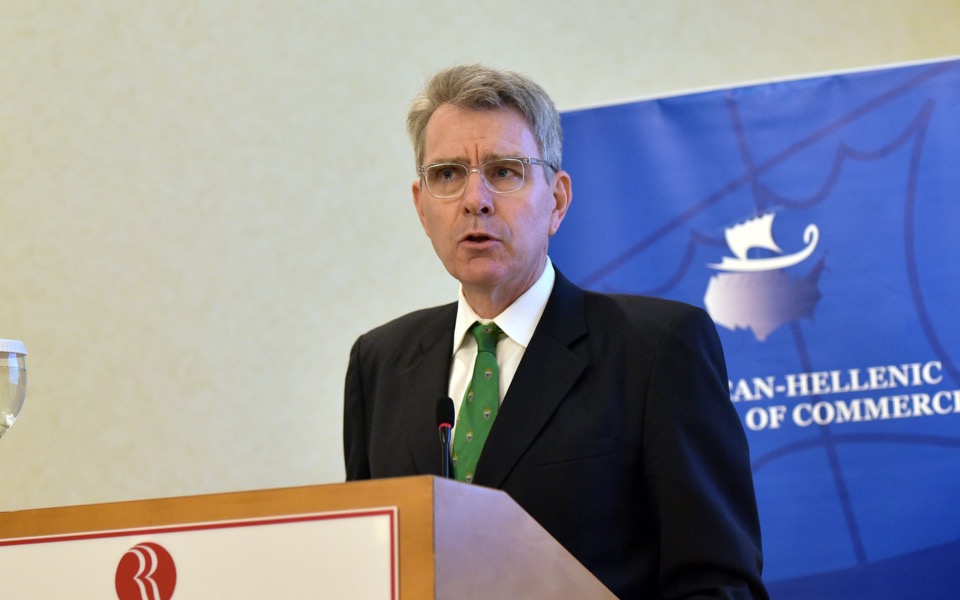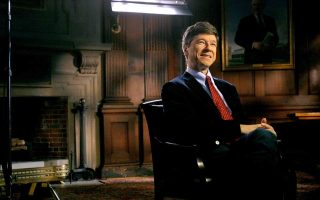Greece ‘a pillar of US strategy in the region’

The United States wants to see northern Greece become a gateway for the transportation of natural gas and commodities to the Western Balkans and Europe, US Ambassador in Athens Geoffrey Pyatt tells Kathimerini.
The senior diplomat underlines American investment interest in the region’s energy network and stresses the importance of the Trans Adriatic and Gas Interconnector Greece-Bulgaria pipelines (TAP and IGB), the creation of a floating liquefied natural gas terminal in the northern Greek town of Alexandroupoli, as well as the need for a railway link from there to Bulgaria.
Pyatt expresses his excitement over an increased American presence in northern Greece, noting that this will materialize over the next year up to the 2018 Thessaloniki International Fair (TIF), where the US is the guest of honor, after China this year.
He also says that he is in the process of arranging a visit by Greek Prime Minister Alexis Tsipras to the White House, while hailing the close defense cooperation between the two countries, centered on the US Navy base at Souda Bay in Crete.
Last but not least, Pyatt praises Athens’s moderate stance vis-a-vis Ankara, adding that Turkey must remain connected to the West.
The US is the country to watch at next year’s Thessaloniki International Fair. What are your plans and expectations?
I was up at Thessaloniki, of course, and had the opportunity to see what the Chinese have done. I congratulated the ambassador. I was also struck, when you look at that event, by the fact that it has a really great potential not just as a big political thing where the prime minister and the opposition leader come and give a speech, but also, because it’s in Thessaloniki, to reinforce Greece’s regional role, this idea of Greece as a pillar of stability.
Frankly, I don’t see China or many of your partners thinking the way we think in terms of Greece’s larger regional impact. We talk about this on the record all the time, the role of Greece as the vanguard of Europe, sitting at the center of that Venn diagram, dealing with the challenges of Eastern Med, the challenges of Maghreb, and the challenges of the Black Sea region, through the Balkans.
You’re going to see as we work over the next 12 months to get ready for Thessaloniki, first of all, a major US focus on northern Greece, but also a focus on Thessaloniki not just as the second capital, as the prime minister called it, but as Greece’s gateway to the countries of the Western Balkans, which are countries – the United States and Greece are emphatically in agreement on this – that need to continue moving towards Euro-Atlantic institutions, moving towards EU membership, moving towards NATO membership if they so choose. That’s a vision which Athens and Washington share, that not everybody else is on board with.
Are tax policies the biggest concern of investors considering Greece, or other factors?
The concern that I hear is that people want a level playing field. If there’s a level playing field, if there’s reasonable certainty in terms of the speed with which regulatory approvals will go through and processes. Then it’s taxes; they’re a pricing factor. You put that into your calculations and you decide if you can make money or not. The biggest concern I hear is bureaucracy, the bureaucratic impediments.
What are investors looking for?
I’ll compare where we are now to where we were in summer of last year when I was getting ready for this job. In the summer of 2016, when I would talk to American companies about Greece, everybody would say: “You must be crazy. Read the newspaper. They don’t know if they’re going to make their next bond redemption. They’ve got all of these programmatic reviews with the troika that are unclear. We keep hearing about the risk of early elections. We don’t know about the stability of the banking system. Exchange rates. Capital controls.” People were very wary – there were a lot of risk factors.
Now those risk factors are largely off the table. What you’ve got are the upsides, the entrepreneurship that the Embassy has tried very hard to support, the strong Greek human capital. I made some comments when I was up in Thessaloniki and I had the chance to walk through some of the university exhibitions. Having done my visit to Patra in the summer, to Patra University, I saw another group of Patra researchers, all of whom were university graduates, mainly from little towns in the Peloponnese that I’d never heard of. But there was this one woman I remember. Her area is microtubes and nanotechnology and she has a startup, which is composed of young people, all of whom came out of the university.
She got her PhD in nanotechnology, and their area of specialization is using nanotubes to strengthen carbon fiber. You know, nobody in Greece knows that this kind of stuff is going on, and it’s a real success story. And the fact that it’s coming out of the universities, which in other parts of the country are so politicized and where it’s really hard to do that kind of thing. So I think people are going to see those opportunities.
Will a meeting take place between the Greek prime minister and the US president or vice president?
We’ll see. We had a very good phone call, Vice President [Mike] Pence with the prime minister [Alexis Tsipras] this summer. As you know, the vice president invited the prime minister to come to Washington as a follow-up to that. We haven’t been able to make it happen yet. I’m very confident it will happen. And when the White House is ready to announce something, they’ll announce it.
But in the meantime, my approach has been, keep building, keep laying the foundation. Find the bricks that we need in terms of energy, in terms of security cooperation, in terms of our investment relationship, in terms of the people-to-people relationship. That’s the great thing about being the American ambassador in Greece right now; we’ve got the building blocks to take what has long been a solid relationship and make it a real lynchpin of how we think about US interests in Europe in the years ahead.
Moving to military cooperation, how important is Souda Bay?
I was very glad that we had Senator [Ron] Johnson here [earlier in September] to go out to Souda. He’s somebody I got to know well through my senate confirmation processes and through Ukraine, and I heard he was going to be in the neighborhood and encouraged him to think about a visit.
I know he was very impressed by what he saw during his day in Crete. He was able to meet with some of the Greek military officers who run the facility and also with the Greek military officer who runs the NMIOTC, the maritime training center. We had two ships in harbor that day. I explained that it’s sort of a typical day. These guys come and go.
But the two things I think that distinguish Souda: One is its geography; the fact that it’s this vitally important platform at a time when the 6th Fleet and the US military is more active in the Eastern Med than it has been in a very long time. Souda is an indispensable platform for resupply, sustainment, all the stuff that we do to pursue the EUCOM mission in this part of the NATO region.
But equally important, and this is the part that I think sometimes gets lost in the translation – all these articles about the contract for one year or five years – is the quality of cooperation between the Greek and American military personnel. Whether it’s our Special Forces guys working on boarding in NMIOTC or the opportunity for our pilots to fly together, to become familiar with each other’s operations, that’s what NATO is all about, ultimately: the solemn commitment on the part of both countries to fight together, to work together. And Souda is a place where we develop and sustain that confidence.
It also fits – based on what I hear from [Defense] Minister [Panos] Kammenos, Alternate Minister [Dimitris] Vitsas, Admiral [Evangelos] Apostolakis – with Greece’s own vision for moving more of your defense footprint to the southern Aegean. And the simple fact is, all of these investments that we make in Souda are dual-use. We are guests. And so the upgrades and investments that we’ve made or NATO has made also are facilitating Greek military operations. They’re an enabler for the Hellenic Navy and the Hellenic Air Force.
I’m not competent to judge, but I do know that my American military counterparts are very respectful of their Greek counterparts. Just to mention a couple of areas, General [Alkiviadis] Stefanis has a superb relationship, is real friends with General Ben Hodges, the Commander of Army Europe. I see that all the time in their correspondence and everything else. General Stefanis is going to the United States this month to be inducted into the War College Hall of Fame – he’s a graduate – in recognition of his accomplishments. There’s the Hellenic Navy – this is a country with a millennia-long maritime tradition – and the Hellenic Navy Special Forces are highly regarded. There’s no doubt there. And then there’s great advantage that the Air Force has in that they’re flying all the time, which means it’s easier to maintain competence.
For better or worse, the Greek military has faced challenges because of the crisis, because of budget, because of maintenance and repairs, but the thing I’ve learned working with the American military over 28 years now in different jobs, the most valuable thing that the US military has is individual soldiers. It’s their competence, it’s their training, it’s their readiness, it’s their preparedness. And on that, Greece has the human capital to meet the highest NATO standards.
Will American gas also come through Alexandroupoli?
That’s the goal, yes. The goal would be contracts. Not just one-off things, but to actually get American investment. There’s also the port privatization, and I’m going to sit down with [privatization fund] TAIPED in the next couple of days and try to get from them a sense of what the timelines are looking like. We’ve got at least one American company that’s interested in Alexandroupoli. There’s obviously enormous potential there. There’s also the idea of developing Alexandroupoli as an energy hub and also a logistics hub if you’re able to materialize this railway project, linking up to Bulgaria. The United States looks at Greece not just as an important bilateral partner, but as a pillar of our strategy in the region. The fact that we got [Deputy Assistant Secretary for Europe] Hoyt [Brian Yee] to come here shows we’re putting our money where our mouth is in terms of the policy process, and I hope we’ll start to see things in the investment area that will reinforce that.
I was very impressed at both the way in which a series of different developments come together around Alexandroupoli – TAP, the floating regasification plant and the IGB Pipeline. I was impressed by the great enthusiasm for more American presence in Alexandroupoli. A couple of months ago I told staff at the Embassy, “Everybody in the pool, we need more business for Thessaloniki.” I said the same thing today on Alexandroupoli. There is a real hunger for American engagement across the board, from politicians, from businesspeople.
How about ExxonMobil’s involvement?
Obviously, it’s very good news if it comes forward. We’re in the super-early days. These things move slower than some people imagine. It involves making commitments of billions of dollars if they move in a decisive way.
The other announcement that came out of Alexandroupoli was Energean, which has significant American investment, has now gotten approval to begin drilling in the Ionian, and then also on-shore Western Greece. That’s going to be an important test as Greece begins to develop its offshore energy, upstream energy resources. It will be very interesting to see if these blocks off of Crete pan out.
Strategically speaking, from the point of view of Washington, how do you see the trilateral relationship between Greece, Cyprus and Israel?
From an American standpoint, there’s only an upside. The important thing about the Israel-Greece relationship is that it’s not just about defense and security. Obviously, the energy issues are strategically significant. I think it’s going to move a little slower than people here guess. It’s just the nature of the industry.
I assume you would also like Turkey included in that?
I leave worrying about US-Turkey relations to my extremely competent colleague, John Bass, and worrying about Greece-Turkey relations to Ambassador [Dimitris] Paraskevopoulos and [Greek Foreign] Minister [Nikos] Kotzias and everybody.
However, first of all and most importantly, we strongly agree with Greece that it’s important to continue reaching out to Turkey. Both the United States and Greece agree that Turkey should remain anchored in the West, anchored in Western institutions. That’s not necessarily the case with all of your fellow EU member-states. So that is the spirit in which our bilateral US-Greece conversation about Turkey takes place.
There’s also great appreciation in Washington for all the efforts this government has made to reach out to and to engage with the Turkish government, whether it’s the expert and senior diplomatic conversations that take place all the time with Paraskevopoulos talking to his Turkish counterpart, the Hellenic military talking to the Turkish military, but also Prime Minister Tsipras’s outreach, his telephone calls, his meetings, and the fact that you had President [Prokopis] Pavlopoulos in Istanbul. I was shocked when that visit happened in the spring – this was the first time in postwar Greek history that a head of state from Greece had traveled to Turkey. So I think that our interest is to see that dynamic sustained and not to inject anything that makes a complicated situation even more difficult.
I will also say over the course of the summer, the four most interesting visits for me were Alexandroupoli, Mytilene, Chios and Rhodes. All four cities that have a deep experience with Turkey, and lots of reasons for historical anxiety. But the major message I heard from politicians, from businesspeople, from civil society in all four places was: “Turkey’s not going anywhere. It’s right there. We can make a lot of money off of all these Turkish yacht owners who come into our harbors, all these Turkish tourists, we have to manage the relationship.” And I think that was a little bit of a surprise for me, actually, to see how forward-leaning those communities can be, and it’s certainly a welcome factor.
How do you see Turkey’s role in the Eastern Mediterranean and its connection to Russia?
First of all, we oppose the second pipe for Turkish Stream. We see that as just another way, like Nord Stream for Europe, to exacerbate its dependence on Russian gas in a way that’s bad for European security, bad for European economic growth. Turkey, by definition, is part of the Southern Corridor. The only way gas gets from Azerbaijan to Greece for TAP is by coming through Turkish territory, so there’s a natural role to play there. And I think we talked earlier about the Israel energy dynamic. As a practical matter, either in terms of future Cypriot energy finds or the very large Israeli offshore finds. And when I talk to the Israelis, they’ll bring that gas to market in a way that works to their advantage. But there are a lot of logistical, financial hurdles to building a pipeline that goes undersea without leveraging the Turkish geography.
So we’ll have to see, but on all of these issues, ultimately markets decide. That’s why we’ve been such strong supporters of the TAP project, because it creates a dynamic for Greece, for Italy and for the countries of the Western Balkans, hopefully, where that market force can actually be – where those market forces can prevail.
What is Washington’s position on the Turkish procurement of the Russian S-400 missile system?
We’ve been very clear and our department spokesman just reiterated how important it is for NATO countries to procure military equipment that is interoperable with NATO systems. A Russian system would not meet that standard, and that’s a concern of ours.





